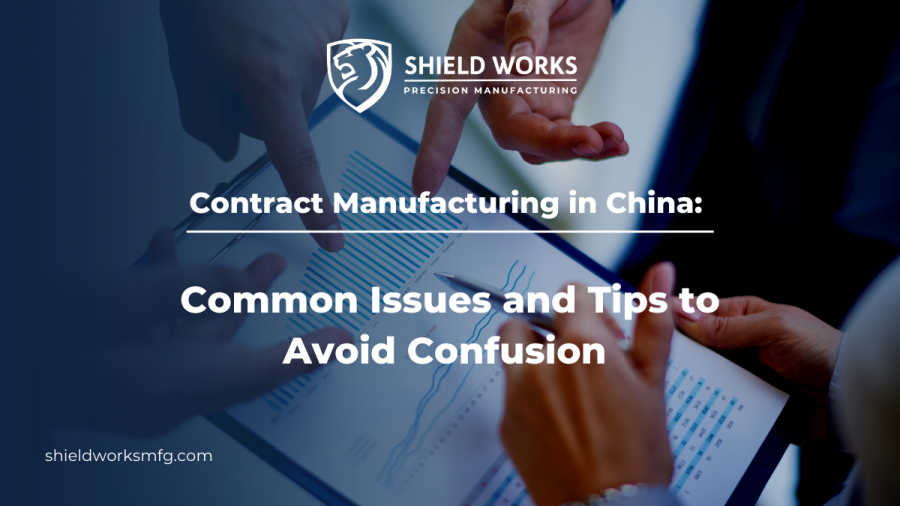Contract Manufacturing in China: Common Issues and Tips to Avoid Confusion

You’ve probably heard about contract manufacturing in China and have wondered if it’s the right choice for your business.
To help you make an informed decision, we’ve put together this guide on some common contract manufacturing mistakes in China, so you can avoid confusion and issues with your Chinese manufacturers and create a strong partnership that benefits both parties involved. Let’s jump right in!
1. Not Understanding the Contract Manufacturing Process
Outsourcing contract manufacturing to China provides many benefits, but it does come with some risks for those who don’t know what they’re doing. Several issues commonly arise when outsourcing to China so make sure you’re aware of them before taking on this task.
One of the major issues that will hurt your business is not knowing the production process from the beginning. You should know what exactly you will be getting in return before going ahead with your work.
Before working with a contract manufacturing company in China, you need to decide what will you want them to take care of for you, for example:
- What are your raw material needs?
- What type of technology will you utilize for this project?
- Are there any prototypes or product samples that require checking out before moving on to the next phase?
- Does your desired item require a custom design?
- Will you use quality control services and when will they be necessary?
- What defect rate can you accept?
From sourcing raw materials and product testing to mass production and final inspection, list all information you need to know before finalizing a particular manufacturing partner because they will help you develop clear expectations about timeframes and product quality.
2. Not Having a General Frame
A new manufacturing project is an exciting endeavor, and often everyone is eager to get started. Though it may seem like you’re jumping right into things, please take some time to discuss this with your suppliers at the beginning. They will appreciate the main information they’ll need to understand what exactly it is that you want them to do.
Try not to overwhelm your vendor with excessive information from the start. It’s best to give them just enough information for them to understand what you need, but also keep in mind that they may have a standard procedure for whatever it is you’re looking for. To make sure things stay consistent, mention your expectations, standards, and deadlines early on. To do this efficiently, don’t go overboard when first explaining your needs. Remember that there might be certain procedures involved with whatever is going to happen.
3. Not Maintaining Constant Communication
Many companies make the mistake of not maintaining constant communication with their Chinese production partner.
To avoid mixed messages or missed signals, it’s important that you stay in contact with your Chinese suppliers for updates. Even something as simple as learning about the production progression can keep things more transparent, which can help to get your product made successfully and correctly, especially when you can’t be physically in China now.
Furthermore, if there are any problems or changes in the timeline, then you need to have a line of communication with your supplier so that both sides can react quickly. The sooner you catch a problem, the easier it will be to fix.
4. Not Involving Enough People
Manufacturing processes abroad tend to be far more complicated than initially perceived when you are new to the field, so it is important that you stay proactive and create a checklist of people to work with.
Your project will go through many different steps before it is completed. From a project manager, engineer, product designer, and quality inspector, ensure that every person you will work with knows what their tasks entail, so no one falls behind or ends up unprepared for an upcoming step.
Do not allow yourself to fall into the trap of continuing to allow the production process to have only a single perspective. Instead, expand the perspectives and make the same communication group. When things go wrong, it would be easier to know who has which responsibilities and thus you know how to optimize it.
5. Not Having a Continuous Improvement Process
In a project-based manufacturing environment in China, the ever-changing needs of design and engineering, combined with the constant demand for customized products make it so hard to produce anything without proper planning. Without constant improvement plans, things can go south very quickly.
No two projects are the same, so sometimes you may need additional resources, or you will want to adjust your team or process during the project.
You should always have a plan for anything that might go wrong when working with manufacturers abroad. In this case, it’s better to have a flexible and clear improvement process, allowing you to spot trouble early on and address issues before they get out of hand.
Consider Working with an Experienced Contract Manufacturer
Even if you plan, it can still be easy to get confused when selecting the right contract manufacturing company in China. This decision should not be rushed as many things need to be considered carefully as many different factors need to be considered, like proximity of the factory, capacities, costs, payment terms, communications with your team on-site as well as an understanding of whether or not the supplier will perform duties such as product design for you.
An experienced and reliable manufacturing partner can help to prevent and solve problems correctly. In this case, look no further than Shield Works.
Founded in 2020, we are an offshoot of the British-owned and managed C2W Group located in the South China Greater Bay Area offering high-quality and competitive contract manufacturing services. We focus on the provision of a tailor-made solution, and we communicate your requirements in your native language to avoid misunderstandings. Start your journey by reaching out today to discuss your product and learn how we can help.
